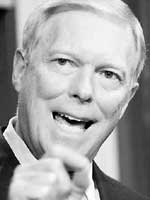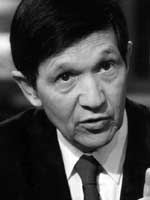One thing about the 10 Democratic presidential challengers: They don’t put their feet in their mouths quite like the incumbent. Unfortunately, that’s about all you can say when it comes to poverty. All slammed the House Republicans for excising the poor from their child tax credit bill last spring and most would raise the minimum wage (to, well, something more than it is now). But for the bulk of the Democratic field, the poor are somewhere between an afterthought and a cudgel with which to bash Bush.
It’s probably to be expected this early in the campaign, says Deborah Weinstein of the Coalition on Human Needs, and maybe even accepted. “If the word ‘poverty’ makes people feel ‘that’s someone else’s problem,’ then I don’t find fault with that,” she says, noting that such policies as jobs programs and expanded access to education would cut across all income sectors. “Having said that, I think some more alarm bells need to be sounded about the failure of programs that are supposed to protect families from poverty.”
It’s probably to be expected this early in the campaign, says Deborah Weinstein of the Coalition on Human Needs, and maybe even accepted. “If the word ‘poverty’ makes people feel ‘that’s someone else’s problem,’ then I don’t find fault with that,” she says, noting that such policies as jobs programs and expanded access to education would cut across all income sectors. “Having said that, I think some more alarm bells need to be sounded about the failure of programs that are supposed to protect families from poverty.”
 |
Carol Moseley Braun
Braun talks a good game but is woefully thin on specifics: “This is a great country, and all we have to do is tap the resources we have to make certain that no American is left behind, that every community has good jobs in it, that people have hope that they can contribute to the whole community to the maximum extent of their ability, whether they’re black, white, Hispanic, male or female.” She called the 1996 welfare reform a “Pontius Pilate approach,” that is “washing our hands of responsibility for poor children.” She backs single-payer health care.
|
 |
Wesley Clark
Like much about the four-star general, little is known about his thoughts on poverty. Don’t look to his threadbare campaign statements for clarification. Here’s the general on the Bush tax cuts, for example: “When you have more money, you have room for the luxuries and one of the luxuries and one of the privileges we enjoy is living in this great country. So I think that the tax cuts were unfair.”
|
 |
Howard Dean
The Vermont governor’s credentials as poverty-fighter rest almost entirely on his plan to expand the Children’s Health Insurance Program—effectively creating a federal expanded Medicaid program to benefit the near-poor—covering everyone at or below 185 percent of the poverty level and all children and young adults at or below 300 percent of poverty. On other matters, there’s less evidence of a crusader for the poor: Dean’s Vermont was an early pioneer of workfare, and the governor has bragged of being one of the “pioneers of welfare reform,” which he thinks “has been an incredibly positive force.” Like most Democrats (and many Republicans), he opposes the 40-hour work week requirement and lack of childcare funding in Bush’s welfare bill, but that’s been the extent of his criticism.
|
 |
John Edwards
Like his campaign, Edwards’ poverty proposals are a mishmash of down-home rhetoric (“Every time I go to vote in the Senate, I get a picture of the people who worked in the mill with my dad.”), inspired policy ideas (a $2,500 family leave credit that would do wonders for parents of newborns), and nuttiness (he’s called for cutting the federal work force by 10 percent, which would not do wonders for the dismal job market). He’s been stumping hard for his College for Everyone plan, which provides one year free tuition at state and community colleges for those who work 10 hours a week. It’s unclear whether students who already work that much to make ends meet while attending school would get the tuition waiver, or what would happen after that first year.
|
 |
Dick Gephardt
His campaign’s pet projects include persuading the World Trade Organization to institute an “international minimum wage” (to raise working conditions both overseas and at home) and establishing a tax credit to encourage employers to cover medical benefits for employees. He was among the 101 U.S. Representatives to vote against the 1996 welfare reform bill.
|
 |
Bob Graham
Like many Democrats, he appears to be positioning himself as the candidate of the not-quite-as-rich-as-Republicans, with promises of “policies that benefit middle-class families, not just the wealthy few.” As a senator, he voted for the welfare reform bill in 1996 (as well as its more onerous 1995 predecessor that President Clinton vetoed). He’s not the most astute of the candidates on poverty issues: When asked at a Children’s Defense Fund forum about the child tax credit, he seemed to misunderstand the question and lashed out at the Bush administration for maintaining too high a payroll tax.
|
 |
John Kerry
The senator from Massachusetts has pitched his economic platform squarely down the middle of the road, declaring himself “for a tax cut for the middle class” who “are getting pummeled everywhere they turn.” (He also said he wouldn’t repeal the Bush tax cuts for the wealthy and said Dean committed an “extraordinary gaffe” when he called for it.) Other positions are similarly centrist to the point of meaninglessness: Kerry says he wants a “comprehensive plan to make four years of college affordable for all” but voted for the 1996 welfare reform bill that limited recipients to one year of education. In 1995, Kerry led Democratic support in the Senate for welfare reform, introducing a “personal responsibility contract” for recipients and opposing benefits for legal immigrants. “We will have to watch closely from the beginning to guarantee that no one falls through the cracks,” he said at the time—his primary effort in this regard has been co-sponsoring an amendment (thus far unsuccessful) to add $2.25 billion a year in childcare funds to the welfare reauthorization bill.
|
 |
Dennis Kucinich
The man who declared “poverty’s a weapon of mass destruction” is the only candidate to address the problems of welfare reform in his campaign statements. (He takes note of plunging college enrollment among welfare recipients, for example.) Like many congressional Democrats, he has called for expanded education and training opportunities for people receiving welfare, saying “education is the only solution proven to reduce poverty levels.” Unlike most of his Democratic colleagues, he believes home childcare should count as an allowable work activity. He supports single-payer health care.
|
 |
Joseph Lieberman
Here’s another candidate who uses the poor mostly as a rhetorical device: He slams President Bush for overseeing “Poverty-gate” but proposes few policy initiatives of his own. (Unless “restart[ing] our economic engine” can be considered a policy.) His record on the poor is heavy on dispensing moral judgment—including a welfare amendment granting states bonuses for reducing teen pregnancy and co-sponsoring faith-based charity programs with arch-nutcase Rick Santorum (R-Penn.). Like Kerry, he voted for the 1996 welfare bill, saying if problems arose “we will all have to be honest enough to come back and fix this.” In June he declared: “In the coming weeks, I will be releasing a detailed plan outlining the specific programs and policies” to fight poverty. We’re still waiting.
|
 |
Al Sharpton
Beyond his street cred as son of a welfare mom, Sharpton’s record on issues affecting the poor is skimpy. Aside from calling for a renewed federal jobs program, the Reverend endorses a series of Constitutional “amendments” sponsored by Rep. Jesse Jackson Jr. (D-Ill.): the Right to Education Amendment, the Right to Quality Health Care Amendment and so on. Sharpton was asked by the Village Voice in February his views on changes to welfare that would require women to work 20 hours more with no additional funds for childcare: “First of all, it is more of the criminalizing the poor for being poor.” But he got no more specific than to suggest “there must be allowances for single parents in terms of childcare.” He supports single-payer health care.
|
Please consider supporting our work.

I hope you found this article important. Before you leave, I want to ask you to consider supporting our work with a donation. In These Times needs readers like you to help sustain our mission. We don’t depend on—or want—corporate advertising or deep-pocketed billionaires to fund our journalism. We’re supported by you, the reader, so we can focus on covering the issues that matter most to the progressive movement without fear or compromise.
Our work isn’t hidden behind a paywall because of people like you who support our journalism. We want to keep it that way. If you value the work we do and the movements we cover, please consider donating to In These Times.
Neil deMause is a regular contributor to In These Times, and the editor of heremagazine.com. His article “Bad to Worse: Welfare Reform Is Up for Reauthorization, But It’s Only Going to Get Meaner” (ITT, Sept. 2, 2002) was selected by Project Censored as one of its Top 25 Censored Media Stories of 2002-03.







